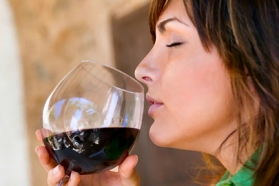The Misconception: Wine is a complicated elixir, full of subtle flavors only an expert can truly distinguish, and the more expensive it is, the better it tastes.
The Truth: There is little correlation between price and taste of wine, and wine experts are fooling themselves into believing they can pick up distinct flavors.
 You scan the isles in the liquor store looking for a good wine.
You scan the isles in the liquor store looking for a good wine.
It’s a little overwhelming – all those weird bottle shapes with illustrations of castles and vineyards and kangaroos. And all those varieties? Riesling, Shiraz, Cabernet – this is serious business.
You look to your left and see bottles for around $12; to your right you see bottles for $60. You think back to all the times you’ve seen people tasting wine in movies, holding it up to the light and commenting on tannins and barrels and soil quality – the most expensive wine has to be the better one, right?
Well, you are not so smart. But, don’t fret – neither are all those connoisseurs who swish fermented grape juice around and spit it back out.
Wine tasting is a big deal to a lot of people. It can even be a professional career. It goes back thousands of years, but the modern version with all the terminology like notes, tears, integration and connectedness goes back a few hundred.
Wine tasters will mention all sorts of things they can taste in a fine wine as if they were a human spectrograph with the ability to sense the molecular makeup of their beverage.
As you may have figured out by now, most of this is pretty much total bullshit.
In 2001, Frederic Brochet conducted two experiments at the University of Bordeaux.
 In one experiment, he got 57 wine experts together and had them taste one glass of red wine and one glass of white wine. He had them describe each wine in as much detail as their expertise would allow.
In one experiment, he got 57 wine experts together and had them taste one glass of red wine and one glass of white wine. He had them describe each wine in as much detail as their expertise would allow.
What he didn’t tell them was both were the same wine. He just dyed the white one red.
In the other experiment, he asked the experts to rate two different bottles of red wine. One was very expensive, the other was cheap.
Again, he tricked them. This time he had put the cheap wine in both bottles.
So, what were the results?
The experts in the first experiment, the one with the dyed wine, described the sorts of berries and grapes and tannins they could detect in the red wine just as if it really was red. Every single one, all 57, could not tell it was white.
In the second experiment, the one with the switched labels, the experts went on and on about the cheap wine in the expensive bottle. They called it “complex” and “rounded.” They called the same wine in the cheap bottle “weak” and “flat.”
Another experiment at Cal-Tech pitted five bottles of wine against each other. They ranged in price from $5 to $90. Similarly, the experimenters put cheap wine in the expensive bottles – but this time they put the tasters in a brain scanner.
While tasting the wine, the same parts of the brain would light up in the machine every time, but with the wine the tasters thought was expensive, one particular region of the brain became more active. Studies are continuing to explore this.
Yet another study has tasters rate cheese eaten with two different wines. One they were told was from California, the other from North Dakota. The same wine was in both bottles. The tasters rated the cheese they ate with the California wine as being better quality, and they ate more of it.
What this points out is the nasty beast of expectation.
Expectation, as it turns out, is just as important as raw sensation. The build up to an experience can completely change how you interpret the information reaching your brain from your otherwise objective senses.
 In psychology, true objectivity is pretty much considered to be impossible. Memories, emotions, conditioning and all sorts of other mental flotsam taint every new experience you gain.
In psychology, true objectivity is pretty much considered to be impossible. Memories, emotions, conditioning and all sorts of other mental flotsam taint every new experience you gain.
In addition to all this, your expectations powerfully influence the final vote in your head over what you believe to be reality.
So, when tasting a wine, or watching a movie, or going on a date – some of what you experience comes from within and some comes from without.
Expensive wine is like anything else that’s expensive, the expectation that it will be taste better makes it taste better.
Restaurants depend on this. Actually, just about every retailer depends on this. Presentation, price, good marketing, great service – it all leads to an expectation of quality. The actual experience at the end of all this is less important. As long as it isn’t total crap, your experience will match up with your expectations.
Your expectations are the horse, and your experience is the cart. You get this backwards all the time because you are not so smart.
Links:
How to Taste Wines
The Wine Snob Scandal
Grape Expectations
No comments:
Post a Comment